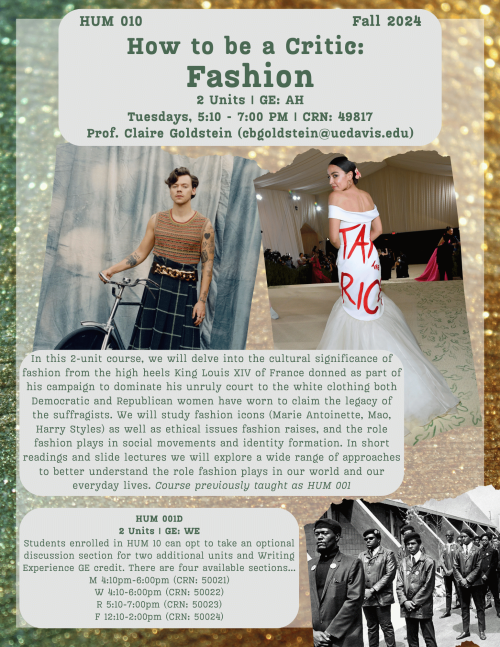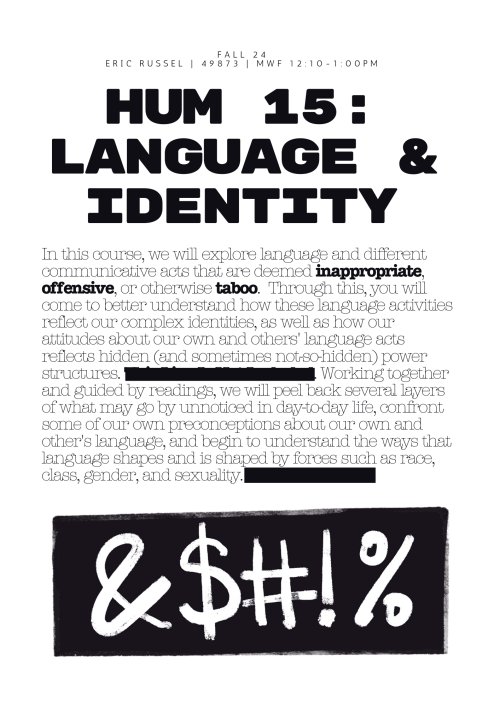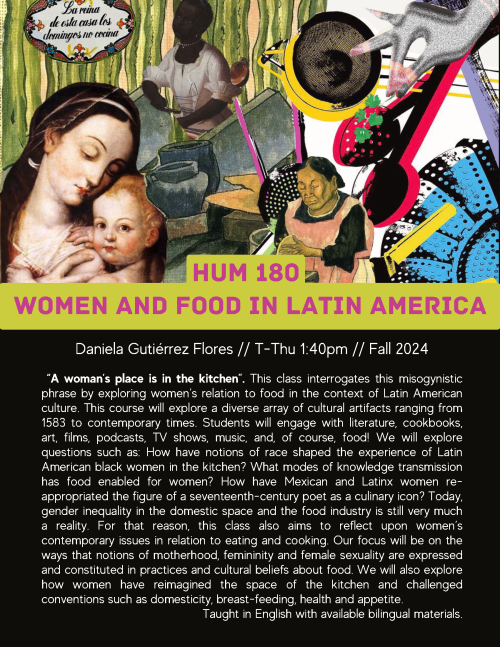Fall Quarter 2024
- For day, time, room, and TA information, see our PDF Schedule or the class search tool https://registrar-apps.ucdavis.edu/courses/search/index.cfm.
- For all courses not described here, please refer to the General Catalog course descriptions: https://catalog.ucdavis.edu/courses-subject-code/hum/
HUM 001 - Humanities Forum: Antisemitism and Islamophobia
Professors Sven-Erik Rose and Mairaj Syed | Wed 4:10-6PM
HUM 010 - How to be a Critic: Understanding Cultural Products & Practices - FASHION
HUM 010D - How to be a Critic: Discussion
Claire Goldstein | Tues 5:10-7
When Clark Kent and Peter Parker become superheroes, we can tell because they have changed their outfits.
When Adam and Eve were expelled from the Garden of Eden in the book of Genesis, the first thing they did was clothe themselves. The biblical text marks the transformation from the state of nature to the dawn of civilized society with the act of putting on clothing.
When people in 18th-century France demanded a new form of government, men showed their revolt against aristocratic privilege by rejecting the knee-breeches (culottes) worn by noblemen and instead wearing long pants.
The revolutionaries were known thereafter as the sans-culottes. Why did Melania Trump wear a blouse with a pussy bow to her husband’s presidential inauguration? And what did Representative Alexandria Ocasio-Cortez wear to the 2022 Metropolitan Museum Gala?
In this two-unit Humanities course*, we will delve into the cultural significance of fashion from the high heels King Louis XIV of France donned as part of his campaign to dominate his unruly court to the white pants suits both Democratic and Republican women have worn to claim the legacy of the suffragists. We will study fashion icons (Marie Antoinette, Mao, Harry Styles) as well as ethical issues fashion raises, and the role fashion plays in social movements and identity formation. In short readings and slide lectures we will explore a wide range of approaches to better understand the role fashion plays in our world and our everyday lives. Approaches will include anthropology; cultural studies; sociology; literary reading; semiotics; psychoanalysis; race and gender studies; and economic, historical and art historical analysis. GE credit: AH.
*Students enrolled in the lecture have the option of enrolling in a once-a-week discussion section, HUM 10D, for two additional units and additional GE credit (Writing). There are four available sections (Monday, Wednesday, Thursday or Friday). Taking a discussion section along with the lecture earns you GE credit: AH, WE.

HUM 015 - Language & Identity
Eric Russell
In this course, we will explore language and different communicative acts that are deemed inappropriate, offensive, or otherwise taboo. Through this, you will come to better understand how these language activities reflect our complex identities, as well as how our attitudes about our own and others' language acts reflects hidden (and sometimes not-so-hidden) power structures. Working together and guided by readings, we will peel back several layers of what may go by unnoticed in day-to-day life, confront some of our own preconceptions about our own and other's language, and begin to understand the ways that language shapes and is shaped by forces such as race, class, gender, and sexuality.
Among many of the questions we will explore are the following:
- Why is it so offensive in our society to talk about some things that other societies find normal or welcome, and the reverse? Why are some words judged to be crass (e.g. ass, shit) while others, which refer to the same thing (e.g. bum, feces) are not?
- How do racialized, offensive insults (e.g. the n-word) reflect our society’s construction of power, inclusion, and privilege? Why is it so difficult to come up with an offensive word for those who identify in certain ways, such as "straight white males"?
- Why are there so many insulting forms targeting women, but relatively fewer that target men? And why do those that insult men frequently associate them to women, but the reverse doesn’t seem to be true?
Who gets to decide what language is “right” or “wrong”? What happens when some speakers decide to not follow hidden social rules, for example reclaiming words like slut or WAP? What does this suggest about the ways our society is configured?

HUM 180 - Women and Food in Latin America
Daniela Guitérrez Flores
“A woman’s place is in the kitchen”. This class interrogates this misogynistic phrase by exploring women’s relation to food in the context of Latin American culture. This course will explore a diverse array of cultural artifacts ranging from 1583 to contemporary times. Students will engage with literature, cookbooks, art, films, podcasts, TV shows, music, and, of course, food! We will explore questions such as: How have notions of race shaped the experience of Latin American black women in the kitchen? What modes of knowledge transmission has food enabled for women? How have Mexican and Latinx women re-appropriated the figure of a seventeenth-century poet as a culinary icon? Today, gender inequality in the domestic space and the food industry is still very much a reality. For that reason, this class also aims to reflect upon women’s contemporary issues in relation to eating and cooking. Our focus will be on the ways that notions of motherhood, femininity and female sexuality are expressed and constituted in practices and cultural beliefs about food. We will also explore how women have reimagined the space of the kitchen and challenged conventions such as domesticity, breast-feeding, health and appetite.
Taught in English with bilingual materials.

